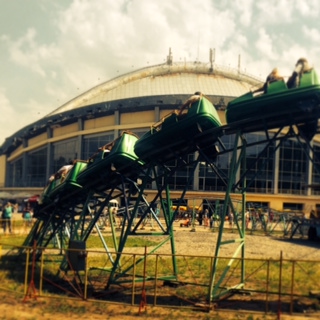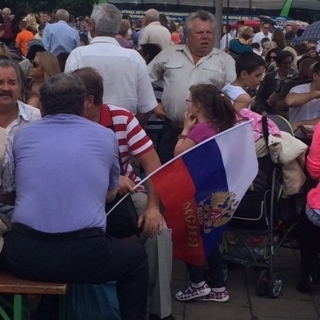Russian Demonstration
On Sunday morning I woke up, grabbed my raincoat, and headed out the door to Vingis Park, well, after a short stop for coffee, of course. I was heading off into the unknown for an adventure in the form of a heavily discussed “Russian Demonstration.” I had no idea what all that meant, but over the course of my forty-five minute walk I could feel myself getting nervous.
Russia is a dominant topic of conversation over here, but not usually the center of pleasant conversation. Ukraine and Russia are geographically very close to Lithuania and the countries’ relations with each other weigh heavily on the minds of Lithuanians. And amidst all of that, the Russian embassy was financing a day of Russian history and culture in Lithuania’s largest park-- part of which serves as a memorial to those who died during soviet occupation. I didn’t know how nervous I was supposed to feel as I walked there, or even if I was supposed to feel nervous at all, but I knew the whole situation was making Lithuanians anxious. My co-workers might have encouraged me to go, but they were quick to tell me it was only because I was a tourist and they wouldn’t be attending out of solidarity. But while the conservative party had gone so far as to suggest revoking the event’s permit, it still wasn’t clear what could possibly be so problematic with a cultural event in a park.
As geographically near as the situation in Ukraine may be, the memories of a soviet state are closer. Lithuania is speckled with reminders of its soviet past, which isn’t actually so distant. Splatters of brutalist-style soviet relics can be found all over Vilnius, often next door to the gothic architecture that it’s so well known for. Anymore, the Khrushchyovka apartments-- with an appearance somewhere between a slum and a dystopian novel-- outside of the old town seem to form a more distinct barrier than the sixteenth century gates ever did. Stories about the KGB are common and painful, and little, if anything, about that era is thought upon fondly.
But Lithuania isn’t a soviet state anymore-- far from it. When I arrived I found a country that felt entirely westernized, perhaps even shockingly so. Yes, there are certainly still cultural influences, but Lithuania has developed well beyond what it was twenty-five years ago. It’s been a member of the European Union for ten years this May, is slated to adopt the euro next year, and while it might not have Starbucks, every block is still lined with a Caif Cafe, a Coffee Inn, or both.
Despite all of Lithuania’s western-european qualities, though, it’s still hard to overlook their relations with Russia. The work I’m doing for Teise underscores many of the current issues in Lithuania arising precisely out of their location somewhere between east and west. When looking at tobacco smuggling trends in Europe, high excise taxes and regulation throughout the European Union are driving illegal activity. Geographically speaking, Lithuania is the ideal country to move cheap cigarettes to and from, but the tension in the region goes much deeper than organized crime and smuggling. Recently, border relations between Lithuania and Kaliningrad (a tiny part of Russia on the Baltic Sea) have worsened-- only facilitating the movement of illicit tobacco. To make matters worse, while Lithuanian customs officials used to be able to directly communicate with officials in Kaliningrad, Russian politics have shifted and now forbid any communication that doesn’t first go through Moscow.
I don’t know what I expected as I walked to the park, but after considering everything going on with Russia I didn’t think anything was off the table. So when I finally figured out that the “russian demonstration” was something resembling a county fair, I was more than a little lost in translation. I don’t know if anticipating some protesters and getting a carnival, albeit heavily policed and perhaps slightly politically charged, is the most appropriate analogy for the political environment between Lithuania and Russia, but it doesn’t seem too far off. It’s confusing and some people are definitely worried, but it’s not clear if that anxiety is justified or exaggerated. The truth, like Lithuania, lies somewhere in between it all, and I think we’ll just have to wait-and-see exactly what the future unfolds for Lithuania’s modern diplomatic relations with Russia. 
